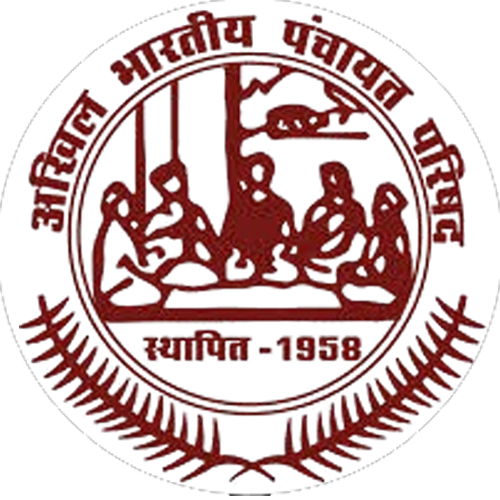All India Panchayat Parishad (AIPP) is the apex body of the Panchayati Raj Institutions in the country. It has affiliate organizations in 29 states, making it a truly national body. It is involved in strengthening Panchayati Raj Institutions and empowering people at the grass roots level. It is a non-political and non-party organization and is registered as a society.
AIPP was set up in 1958 at a conference in Deoghar, Jasidih, Bihar. It was launched in the presence of Late Shri Balwant Rai Mehta, Loknayak Shri Jay Prakash Narayan and Shri Guljari Lal Nanda amongst others. Shri Balwant Rai Mehta was elected as the first President.
The central office of the organizations was moved to Delhi in 1961 where is established its headquarters namely, Panchayat Dham in Mayur Vihar Phase-1 in East Delhi on a plot measuring 7.5 acres in area. Loknayak Shri Jay Prakash Narayan took over the reins of the organizations in 1961 and continued as the president till 1968. He was followed by late Shri Surendra Kumar Dey.

The AIPP aims at achieving Gandhi ji’s dream of “Gram Swaraj” AIPP was established to translate to the dream of “Gram Swaraj” of Mahatma Gandhi. According to him gram swaraj must begin from below. In implies that the villages will not deepened for satisfying its basic needs upon to neighbors. But for others needs will seek help from outside. Each village shall produce food, grain and cotton for cloths. Each village should have sufficient land on which its cattle’s may graze and the children and the young may play to entertain then solves. Each village shall be democratic and proposed. None will be illiterate and unemployed. There shall be nutritious food for all, every house for living and enough cotton cloth to cover bodies for all. Each person shall be aware of the rules of the rules of cleanliness and good health and will observe them in their lives. Each village shall have its own theatre and assembly hall. Pure drinking water shall be provided to them caste and practices of untouchability shall have no place there. Gaps before the rich and the poor shall be bridged. Peace force in each village shall defend the people. The governing power of the village government shall be based on non violence. | shall devote myself to build India in which the poorest of the poor shall feel that India is his or her country and his voice has importance in the nation building. True Swaraj cannot be built by oligarchy but itis possible only when all the people are strong enough to oppose the misuse of power and authority.
There are about 908,804,812 rural habitations in the country. There are an estimated 262,800 gram panchayats in India today Panchayats cover about 96% of India’s more than 5.8 lakh (580,000) villages and nearly 99.6% of the rural population, and 6613 intermediary or block-level Panchayats, and 630 district level panchayats.
The All India Panchayat Parishad operates through its Working Committee which has strength of 31 elected representatives. The General Body elects members to the council which operates as the advisory body, generally consisting of members of Zilla Parishads, Blocks and Panchayat Samitis. In addition, AIPP has 29 state affiliate/organizations that extend the system to the grass roots level.
The Parishad has established a large campus spread over 7.5 acres of land in the heart of fresh rate colony known as Mayur Vihar Phase- 1, Delhi. It has a permanent office building and residential house for the officers and the employees. Also there is a guest house with sufficient facilities where the elected representatives may stay during their visits to Delhi.
The AIPP has also a rich library on the campus and is aiming at making it a special library on Panchayat Raj in India.
At present, the AIPP is functioning under the able and dynamic leadership of Shri Subodh Kant Sahay, President of AIPP.
He has injected a new life to the AIPP. His Slogan is : AIPP = struggle for achieving the rights of PRIs from the state government as enshrined in the 73” Constitutional Amendment 1993. His today’s priority is to strengthening the AIPP and the State Panchayat Parishad. His leadership has brought continuity and stability to AIPP. He is being assisted by an executive committee consisting of the 31 members.
The AIPP will make an effort to establish an information window of its own office and the offices of State Panchayat Parishad so that the people may know about programmes related to rural development. Organizations of the state and districts levels have to be made more active. Regular publication of Panchayat Sandesh, the monthly journal of AIPP in English and Hindi is to be managed and the target is that each elected member PRIs receives a copy of it’s regularly. A seminar on Decentralization is in pipeline. Also the AIPP has to be made economically viable.
Last but not of least importance is the agenda for establishing training center for the officers, elected representatives of PRIs and NGOs interested in gaining knowledge related to Panchayati Raj in India.

All India Panchayat Parishad (AIPP) is a Govt. recognized autonomous apex Federation of Panchayati Raj Institutions, addressing the issues of rural India and aiming to strengthen the Panchayati Raj system, a decentralized form of self-governance at village level to solve local socio-economic problems effectively red to agriculture, health, education, natural resource management and unemployment.
© 2025 All India Panchayat Parishad | Designed by ASH Webtech Inc
WhatsApp us